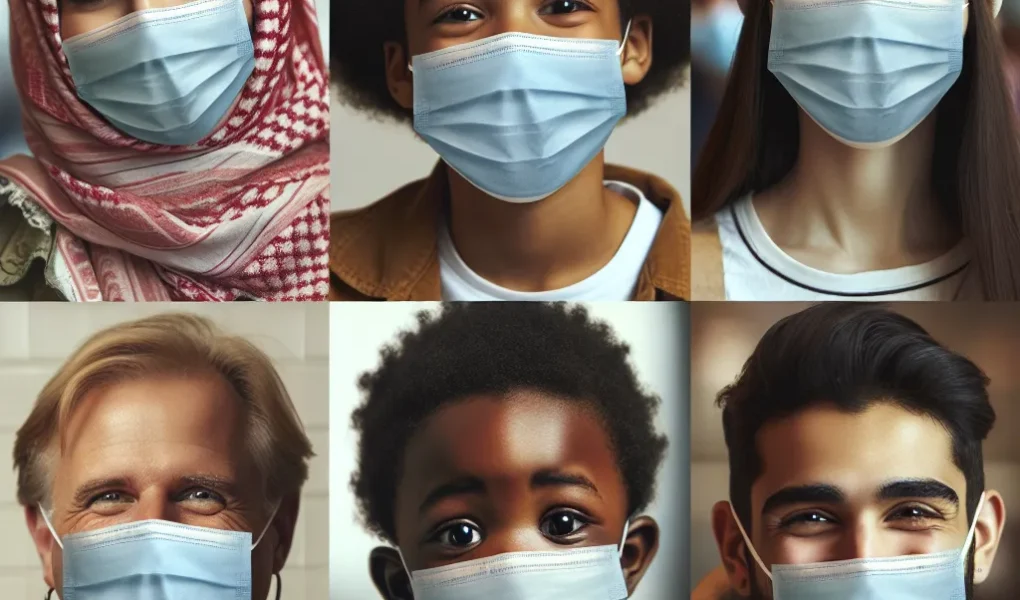The Behavioral Changes Associated with Mask-Wearing
Wearing masks in public has become a common practice in the effort to reduce the spread of infectious diseases, particularly during the COVID-19 pandemic. This behavioral change, while crucial for public health, has also brought about significant psychological impacts on individuals.
The act of wearing a mask triggers various behavioral changes in people. One notable change is the increase in cautious and vigilant behaviors. Studies have shown that when individuals wear masks, they tend to be more conscious of their surroundings and adherent to social distancing guidelines. This heightened awareness of personal space and interactions is a direct result of the mask-wearing behavior.
Furthermore, mask-wearing has been linked to changes in nonverbal communication. With a large part of the face covered, individuals may rely more on eye contact and body language to convey their emotions and intentions. This shift in nonverbal communication has the potential to impact social interactions and may lead to a greater emphasis on interpreting nonverbal cues.
Additionally, the act of wearing a mask in public settings has been associated with a sense of anonymity for some individuals. This perceived anonymity can influence behavior, leading to a feeling of detachment from social norms or responsibilities. On the contrary, for others, the act of wearing a mask may reinforce a sense of responsibility and altruism, as it signifies a commitment to safeguarding the health of oneself and others.
In conclusion, the behavioral changes associated with wearing masks in public are wide-ranging, encompassing heightened vigilance, shifts in nonverbal communication, and varying perceptions of anonymity and responsibility. Understanding these behavioral changes is essential in comprehending the overall psychological impact of mask-wearing on individuals and society as a whole.
Coping with Social Anxiety and Mask Use
Wearing masks in public has become a new norm in many parts of the world due to the ongoing COVID-19 pandemic. While the primary purpose of wearing masks is to prevent the spread of the virus, it’s essential to recognize the psychological impact they can have, particularly for individuals coping with social anxiety.
Social anxiety is characterized by an intense fear of social situations and the scrutiny of others. For those already dealing with social anxiety, the added element of wearing a mask can exacerbate their feelings of unease and discomfort in social settings. The inability to see others’ facial expressions and the sensation of being “masked” oneself can heighten the sense of disconnection and difficulty in social interactions.
However, there are strategies that can help individuals with social anxiety cope with the challenges of wearing masks in public. One approach is to focus on controlled breathing techniques, which can help manage the physical symptoms of anxiety such as rapid heartbeat and shortness of breath. Additionally, practicing self-compassion and positive self-talk can provide a buffer against the negative thoughts and self-criticism that often accompany social anxiety.
It’s also important for individuals with social anxiety to remember that they are not alone in their experiences. Seeking out support from mental health professionals, joining online or in-person support groups, and sharing their concerns with trusted friends or family members can all contribute to a sense of community and understanding.
Ultimately, while the act of wearing masks may present additional challenges for individuals with social anxiety, it’s crucial to prioritize both physical and mental well-being in these uncertain times. By utilizing coping strategies and seeking support, individuals can navigate the psychological impact of mask use and work towards maintaining their overall mental health.
Mask-Wearing and the Perception of Trust
Wearing masks in public has become a ubiquitous sight in response to the COVID-19 pandemic. While they are crucial for preventing the spread of the virus, the psychological impact of mask-wearing is a topic of growing interest. One particular aspect that has garnered attention is the effect of masks on the perception of trust.
Research suggests that the act of covering the face, which is traditionally a focal point for reading emotions and forming first impressions, can lead to decreased feelings of trust. Psychologically, when faces are partially obscured, it becomes challenging to interpret expressions fully, leading to a sense of disconnect in social interactions. This can result in individuals feeling less trusting or more apprehensive towards others when their faces are masked.
Moreover, the lack of facial visibility may affect nonverbal communication cues, which are integral to building trust. Subtle expressions, such as a smile or a furrowed brow, play a significant role in conveying sincerity and openness. With masks concealing these cues, individuals may find it harder to gauge the intentions and emotions of those around them, leading to a potential erosion of trust.
On a societal level, the widespread use of masks has altered the dynamics of public interactions. The inability to see facial expressions can influence people’s perceptions during everyday encounters, from casual conversations to business transactions. This shift in perception underscores the need for alternative methods of engendering trust, such as clear and explicit verbal communication, active listening, and body language to compensate for the obscured facial cues.
As we navigate the continued use of masks in public spaces, it is essential to acknowledge and address the psychological effects they may have on our innate perception of trust. Understanding these dynamics can pave the way for strategies to maintain and foster trust in interpersonal relationships and societal interactions amidst the mask-wearing culture.
The Psychological Effects of Prolonged Mask Use
Wearing masks in public has become a common practice in the effort to combat the spread of COVID-19. While the primary purpose of wearing masks is to protect physical health, it’s important to consider the psychological impact of prolonged mask use. The prolonged use of masks can have various psychological effects on individuals, including feelings of anxiety, claustrophobia, and social discomfort.
One of the psychological effects of prolonged mask use is the feeling of anxiety. Wearing a mask can create a sense of unease and fear in some individuals, especially those who may already struggle with anxiety disorders. The sensation of having a cloth covering over one’s face for an extended period can be distressing for some people, leading to increased levels of anxiety in public settings.
Claustrophobia is another psychological challenge that can arise from prolonged mask use. The feeling of constriction and the limited airflow that comes with wearing a mask can trigger claustrophobic responses in susceptible individuals. This can make it difficult for people to comfortably wear a mask for an extended period, potentially leading to avoidance of situations that require mask use.
Social discomfort is also a significant psychological effect of prolonged mask use. Masks obstruct facial expressions and limit non-verbal communication, which are essential components of human interaction. As a result, individuals may experience difficulties in socializing and connecting with others while wearing masks, leading to feelings of isolation and disconnection.
It’s important to acknowledge and address the psychological impact of prolonged mask use, especially for individuals who may already be vulnerable to anxiety or other psychological challenges. Strategies such as gradual desensitization to mask wearing, creating mask-free zones when appropriate, and promoting open communication about mask-related anxieties can help mitigate the psychological effects of prolonged mask use and support overall mental well-being.
Mask-Wearing and Cultural Differences in Psychological Impact
Wearing masks in public has become a common practice in many parts of the world as a preventive measure against the spread of infectious diseases such as COVID-19. However, the psychological impact of mask-wearing can vary significantly across different cultures. Cultural differences play a crucial role in shaping individuals’ perceptions and attitudes towards wearing masks in public.
In some cultures, wearing a mask may be perceived as a collective effort to protect the community, thereby instilling a sense of solidarity and responsibility. Conversely, in other cultures, wearing a mask might be associated with fear, anxiety, or a lack of trust in the effectiveness of preventive measures. These differing cultural perspectives can influence the psychological well-being of individuals and their willingness to comply with mask-wearing mandates.
Moreover, the cultural significance of facial expressions and non-verbal communication varies across different societies. For example, in cultures where facial expressions hold great importance in interpersonal interactions, the act of wearing a mask can disrupt social cues and lead to feelings of isolation or disconnection. On the contrary, in cultures where maintaining personal space and minimizing physical contact is the norm, the use of masks may not substantially impact social dynamics.
Understanding the cultural nuances surrounding mask-wearing is imperative in effectively addressing the psychological implications for individuals within diverse communities. To promote widespread acceptance and adherence to mask-wearing guidelines, it is essential to consider the cultural context and tailor messaging and interventions accordingly.
Techniques for Managing Mask-Related Distress
As wearing masks in public becomes a norm, many individuals experience a range of psychological distress associated with this practice. Techniques for managing mask-related distress can play a crucial role in alleviating these emotional challenges. One effective strategy is gradual desensitization, wherein individuals slowly expose themselves to wearing masks for short periods of time, gradually increasing the duration as they become more comfortable. This method can help reduce anxiety and discomfort associated with mask-wearing.
Cognitive-behavioral techniques, such as reframing negative thoughts about mask-wearing, can also be beneficial. Encouraging individuals to reevaluate their perceptions of masks from being solely restrictive to a proactive measure for safety and protection can help shift their mindset and reduce distress. Additionally, mindfulness and relaxation techniques, including deep breathing exercises, can aid in managing heightened emotions related to mask-wearing.
Furthermore, seeking social support and engaging in open discussions about mask-related distress can provide individuals with a sense of validation and understanding. Connecting with others who may share similar concerns can foster a supportive environment, thus normalizing the emotional challenges associated with mask-wearing.
Incorporating these techniques for managing mask-related distress can empower individuals to navigate the psychological impact of wearing masks in public, promoting emotional well-being during these unprecedented times.
Building Resilience in the Era of Mask-Wearing
As the world continues to grapple with the effects of the COVID-19 pandemic, the act of wearing masks in public has become an essential practice. However, the psychological impact of constantly wearing masks cannot be understated. People are experiencing a range of emotions, from anxiety and discomfort to a sense of disconnection when their faces are hidden from view. Despite these challenges, there is an opportunity to focus on building resilience in the era of mask-wearing.
Resilience, in the context of mask-wearing, can be viewed as the ability to adapt to the new norm, manage stress, and maintain a sense of well-being amidst ongoing change. One way to foster resilience is by normalizing mask-wearing as a collective effort to protect public health. By reframing the act of wearing masks as a proactive and responsible behavior, individuals can shift their mindset from a place of uncertainty to a sense of purpose and community solidarity.
Another crucial aspect of building resilience is self-compassion. Individuals need to recognize the challenges of mask-wearing and be kind to themselves as they navigate this unfamiliar terrain. Practicing self-care, engaging in activities that bring joy, and seeking social support can all contribute to strengthening psychological resilience.
Furthermore, promoting a sense of control can enhance resilience in the era of mask-wearing. Encouraging individuals to focus on aspects within their control, such as proper mask hygiene and personal protective measures, empowers them to feel more secure in a situation that might otherwise evoke feelings of helplessness.
Ultimately, by acknowledging the psychological impact of wearing masks in public and actively working towards building resilience, individuals can adapt to the challenges of the current environment with greater strength and fortitude.



